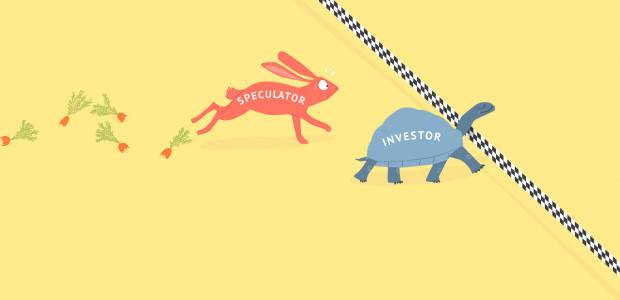What is difference between investment and speculation
There are a lot of approaches to trading and making money online and almost everyone can find a suitable method. However, ability to see the difference between investment and speculation is crucial for figuring out a trading strategy. There are major differences: the level of risk and the investor’s attitude to stock market moves.
Speculation definition
On the financial markets, speculation is an investment in stock, currency, commodity or any other asset in hope for a notable gain but with high risk of loss. Speculative investments are often short term investments used to earn daily cash online. Speculators are more likely to take short positions – open sell orders on the assets they don’t own in hopes that it’s price will go down. The main idea behind speculative investment is to make profit on sharp market moves, predict where the price will go next and benefit from it. Short term investment ideas that earn daily cash online may include intraday currency trading or even scalping, frequent futures trading, stock or options trading, etc. A very common way to invest and make money online daily used by speculators is called “trading the news”. It means opening trades preceding or following macroeconomic data releases that will affect the market. For example, a UK authority reports faster than expected growth of British GDP. This leads to a short-term appreciation of pound sterling that takes place minutes after the report is released and may last from a few hours to a day – until other important news come in the limelight. To make money on this news investor can start buying GBP before the report (higher risk level, because this trade is based on an assumption) or right after the report is released (limited risks, but less profit).
Investment definition
There are various definitions of investing. Most sources agree that investing means buying an asset in hopes that it will bring profit or raise in price over time. Wikipedia gives a more broad description: to invest is to allocate money in the expectation of some benefit in the future. Since our focus is to draw a line between investment and speculation we will rely on the first more narrow definition of investment. Unlike a speculator trying to generate short term profit on temporary market glitches, investor is usually looking deeper and performing more thorough analysis to find long term investment options – undervalued assets or assets with strong potential for growth.

One of the popular long term investment schools of 20th century is called Value Investing. This low risk investment example, formulated by Benjamin Graham and used by Warren Buffet and Peter Lynch, is based on finding asset’s «intrinsic value». Investor’s goal is to find undervalued stocks based on a large number of factors, including competitive advantages, strength of management team, debt/equity ratio, price-to-earnings ratio, etc. and then invest in those assets. Development of technical analysis has significantly reduced opportunities for value investing, but many people still successfully follow this strategy to make money online. Of course, there are other approaches to low risk investments, but value investing is probably the best example to explain true investor’s mind set. This is how Warren Buffet describes his investment style: “I never attempt to make money on the stock market. I buy on the assumption that they could close the market the next day and not reopen it for five years.” This doesn’t mean that all investor’s hold on to stocks for five years or longer, should there arose a good opportunity to sell at a high price they won’t miss a chance to make profit on it. The key is to ensure you have a strong enough portfolio to withstand temporarily market sell offs without panicking and wait patiently for the assets to appreciate in value. By the way, those flash sell offs often open great opportunities to buy quality investment assets at a lower price.
Investment risk levels and returns
Since investment risk and returns play the key role in speculations versus investment comparison, it is important to learn how to calculate both first.
Most people have an idea how to calculate yearly returns for themselves, even if they are far from investing. In absolute values profit can be figured out using the formula below:
- Current market price – Price at which an asset was bought + Any profit generated by the asset during time of ownership
To have more accurate results, make sure to subtract any broker fees or commissions related to this investment.
But in most cases investment returns are calculated in %. To find the percentage of profit take the figure from an equation above, divide it by the price at which asset was bought and multiply by 100. For your convenience, here is a full equation:
- (Current market price – Price at which an asset was bought + Any profit generated by the asset during time of ownership) x 100 / Price at which an asset was bought
Investment risk levels are harder to estimate and there is no “one size fits all” solution or math formula. In finance, risk means the chance that a stock or currency or any other investment asset will move in the opposite direction to your trade. In order to determine whether the asset will appreciate in price you need to consider a lot of factors, such as past performance, average volatility, real market value or market sentiment. Some people prefer to rely on technical analysis to find undervalued assets, others pay more attention to fundamental factors. Assets with guaranteed profit, for example bonds issued by a stable company or government treasuries, are considered low risk investments. Investment that are hard to predict, for example start ups or bitcoins, are considered high risk. In many cases levels of risk depend on investment strategy rather then the asset. For example, option trading or trading short positions (trading against the asset in hopes that it will depreciate) has higher investment risk levels and may lead to higher losses than some kinds of stock trading.
Speculation vs investment
Both investment and speculation can be profitable at times and bring losses at the other. A lot of people try to invest online and make money daily, but this speculative approach often leads to major disappointment in the long run. If you check out the list of most successful investors of all times, you will notice that there are no speculators or intraday traders. Most greatest investors made their money by taking long positions at the right time. “Buy low, sell high” rule seems a no-brainer, but in practice it is a lot easier to say than to do. If you want to succeed on the financial market try to master the skill of remaining calm and thoroughly analysing the situation before opening a trade (don’t give in to panic or euphoria and buy/sell because everyone else is doing so).
If short term investment ideas still seem more interesting to you, despite high risks associated with it, accept the fact that you are not a psychic. Trying to predict the market means taking educated guesses with a high chance that you will be wrong. Let this knowledge be the key stone of your trading strategy and never put all eggs in one basket (set stop losses and don’t put too much money to a single trade). Get yourself familiar with leading indicators – the ones used to predict changes in official macroeconomic data (PMIs, Consumer sentiment indexes, etc.) – since they may help a lot in predicting short term market moves.
Whether you prefer investment or speculation, make sure that you are building a balanced trading portfolio and that your trading strategy is in line with your personal financial goals and risk-tolerance level.



 English
English
No comments